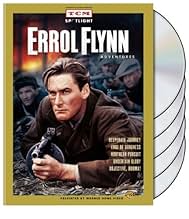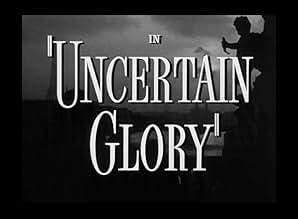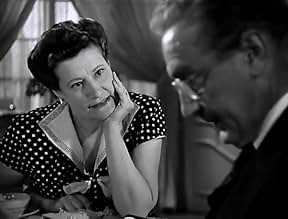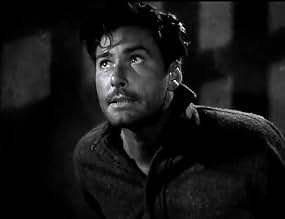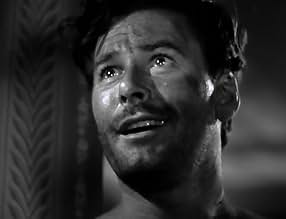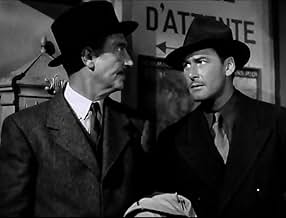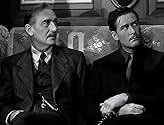IMDb रेटिंग
7.1/10
1.6 हज़ार
आपकी रेटिंग
अपनी भाषा में प्लॉट जोड़ेंAfter a career criminal is recaptured and knows he faces the guillotine, he offers to exchange his life for 100 hostages slated for execution by the Germans.After a career criminal is recaptured and knows he faces the guillotine, he offers to exchange his life for 100 hostages slated for execution by the Germans.After a career criminal is recaptured and knows he faces the guillotine, he offers to exchange his life for 100 hostages slated for execution by the Germans.
Douglass Dumbrille
- Police Commissioner LaFarge
- (as Douglas Dumbrille)
Felix Basch
- Gestapo Major
- (बिना क्रेडिट के)
Frederic Brunn
- German Soldier Reporting to Major
- (बिना क्रेडिट के)
Nora Bush
- Townswoman
- (बिना क्रेडिट के)
James Carlisle
- Townsman
- (बिना क्रेडिट के)
Wallis Clark
- Razeau
- (बिना क्रेडिट के)
Pedro de Cordoba
- Executioner
- (बिना क्रेडिट के)
Fred Cordova
- Execution Guard
- (बिना क्रेडिट के)
फ़ीचर्ड समीक्षाएं
It was not until Marcel Ophul's 'Le Chagrin et la Pitié' that the myth of unified French resistance during the Nazi occupation was well and truly shattered. In this film from twenty-six years earlier France is likened to a nag who is 'too old to beef and too tough to die.'
This is a formulaic Warner Bros treatment but what a formula! Fluid editing and atmospheric cinematography from Warner stalwarts George Amy and Sidney Hickox with a dramatic score by Adolph Deutsch.
Warners had taken a chance on the unknown Errol Flynn as Captain Blood in 1935 and in Jack Warner's words: "we knew that we had grasped the brass ring in our thousand to-one shot spin." This is the fifth of seven films starring Flynn and directed by Raoul Walsh and as Flynn is the uncredited executive producer for his own short-lived Thomson Company one assumes he had a say in the casting.
Paul Lukas seems the obvious choice following his stunning performance in 'Watch on the Rhine' and it is the dynamic between his Inspector Bonet and Flynn's criminal Picard/Lafont that makes the film work. There is the customary mish mash of accents of course and Hollywood's inevitable 'God' element is here represented by the charismatic priest of Dennis Hoey. The formidable Lucille Watson never disappoints and there is a lovely performance by the enchanting newcomer Jean Sullivan who soon gave it up to concentrate on her first love, dance.
Throughout its forty-year existence Warners had some trash but it was seldom boring or pretentious and this entertaining film, although certainly not a 'classic', is no exception.
This is a formulaic Warner Bros treatment but what a formula! Fluid editing and atmospheric cinematography from Warner stalwarts George Amy and Sidney Hickox with a dramatic score by Adolph Deutsch.
Warners had taken a chance on the unknown Errol Flynn as Captain Blood in 1935 and in Jack Warner's words: "we knew that we had grasped the brass ring in our thousand to-one shot spin." This is the fifth of seven films starring Flynn and directed by Raoul Walsh and as Flynn is the uncredited executive producer for his own short-lived Thomson Company one assumes he had a say in the casting.
Paul Lukas seems the obvious choice following his stunning performance in 'Watch on the Rhine' and it is the dynamic between his Inspector Bonet and Flynn's criminal Picard/Lafont that makes the film work. There is the customary mish mash of accents of course and Hollywood's inevitable 'God' element is here represented by the charismatic priest of Dennis Hoey. The formidable Lucille Watson never disappoints and there is a lovely performance by the enchanting newcomer Jean Sullivan who soon gave it up to concentrate on her first love, dance.
Throughout its forty-year existence Warners had some trash but it was seldom boring or pretentious and this entertaining film, although certainly not a 'classic', is no exception.
I am like the poster who managed to go 40 years without seeing this movie. I can say that I liked it very much.
Yes it was a war time movie with all the baggage that entails, but the acting and story were good especially for this genre. It had tension and that tension never really let up for long. The turns and twists of the story were well grounded and the actions made sense within the context of some theatrical license. As with most movie buffs, your mind is ahead of the movie. But in this one I was never really sure which way the story would turn until the end. To me, that is a job well done.
I suppose if it were made today, Flynn would have been just as likely to not have done the noble thing. In the interests of a just society, I am glad he did. I too thought it was one of his best performances.
Yes it was a war time movie with all the baggage that entails, but the acting and story were good especially for this genre. It had tension and that tension never really let up for long. The turns and twists of the story were well grounded and the actions made sense within the context of some theatrical license. As with most movie buffs, your mind is ahead of the movie. But in this one I was never really sure which way the story would turn until the end. To me, that is a job well done.
I suppose if it were made today, Flynn would have been just as likely to not have done the noble thing. In the interests of a just society, I am glad he did. I too thought it was one of his best performances.
Uncertain Glory (1944)
A rather good war drama, a bit pre-packaged but very well done, as pretty much all Warner Bros films were from this era. Errol Flynn was at a point in his career when he wanted to become a "leading man" in the broader sense, not just a sword-fighting (and handsome) daredevil.
Key to the movie is the quasi-propaganda quality of the movie, set and made during World War II. That's not a bad thing—it's not government propaganda at all, but simply rooting for the good guys, and putting the French (our allies) in a good light (which they deserve).
The plot twist is simple and comes out early, so this gives nothing away—Flynn is a petty criminal who killed someone in a moment of panic, almost by accident, and he's about to have his head chopped off. But then an opportunity (dramatically and beautifully done) suggests a different way to die: for the Cause. The question is whether he can follow through, or whether he'll follow his new romantic (and idealized) love interest to a free new life.
It's all rather good even if contained in movie expectations. The police detective who is guarding and helping Flynn's character is a stalwart of the period, Paul Lukas, and he adds a needed level of gravity and even complexity to the interactions. Flynn is a cheerful presence—very American (even though he's from Tasmania!)—but he often responds rather than leads his scenes. The third lead is the woman, played with wonderful honesty by Faye Emerson.
Part of enjoying these WWII movies is knowing their context, and getting how the audience was wild for a sense of the war, of knowing who was winning, and of sensing how the scene worked, what the French were really like, what the chances were for a soldier caught up in it all. Their brother, their son. And that's kind of what this movie is about, showing heroism, and goodness, and how the war is a just cause and the Nazis are truly horrible (they were). Flynn does what he needs to do here, and if there is artifice and some lack of total believability, that's almost necessary so that a safe distance and cushion is in place.
Not an essential movie, but a really good one, especially if you already like this kind of film and this era.
A rather good war drama, a bit pre-packaged but very well done, as pretty much all Warner Bros films were from this era. Errol Flynn was at a point in his career when he wanted to become a "leading man" in the broader sense, not just a sword-fighting (and handsome) daredevil.
Key to the movie is the quasi-propaganda quality of the movie, set and made during World War II. That's not a bad thing—it's not government propaganda at all, but simply rooting for the good guys, and putting the French (our allies) in a good light (which they deserve).
The plot twist is simple and comes out early, so this gives nothing away—Flynn is a petty criminal who killed someone in a moment of panic, almost by accident, and he's about to have his head chopped off. But then an opportunity (dramatically and beautifully done) suggests a different way to die: for the Cause. The question is whether he can follow through, or whether he'll follow his new romantic (and idealized) love interest to a free new life.
It's all rather good even if contained in movie expectations. The police detective who is guarding and helping Flynn's character is a stalwart of the period, Paul Lukas, and he adds a needed level of gravity and even complexity to the interactions. Flynn is a cheerful presence—very American (even though he's from Tasmania!)—but he often responds rather than leads his scenes. The third lead is the woman, played with wonderful honesty by Faye Emerson.
Part of enjoying these WWII movies is knowing their context, and getting how the audience was wild for a sense of the war, of knowing who was winning, and of sensing how the scene worked, what the French were really like, what the chances were for a soldier caught up in it all. Their brother, their son. And that's kind of what this movie is about, showing heroism, and goodness, and how the war is a just cause and the Nazis are truly horrible (they were). Flynn does what he needs to do here, and if there is artifice and some lack of total believability, that's almost necessary so that a safe distance and cushion is in place.
Not an essential movie, but a really good one, especially if you already like this kind of film and this era.
Errol Flynn always wanted to prove that he was a dramatic actor of range, not an athletic non-entity who was always demonstrating his abilities as a horseman, a fighter, or a swordsman. That his best adventure films did show him as more than just an acrobat he barely understood. He wanted to play normal types. But normal types look more like Walter Matthau or Paul Muni or Allan Jenkins - they are not the strikingly handsome Flynn.
In 1944 Flynn did this film which was a war picture but not like DIVE BOMBER or OBJECTIVE: BURMA. The film was about a French criminal who had committed a murder and was tried and convicted for that homicide. He is able to escape the guillotine when a bomb hits the prison just as the execution is about to occur. He flees, and manages to get into the countryside. Pursuing him is Paul Lucas, the French police inspector who arrested him originally. Lucas finds Flynn, but at that time an act of sabotage against the Nazis occurs. When the Nazis threaten to kill 100 French hostages unless the saboteurs appear, Flynn offers Lucas a "devil's" choice: If Lucas will not act for the next few days, Flynn will surrender himself to the Nazis as the saboteur (he prefers being shot by a firing squad rather than being guillotined). Lucas has little real choice - unless he is willing to do the same thing instead of Flynn. But will Flynn keep his word or not? As Flynn meets a young girl and finds that they can flee away together, the audience wonders if he'll do the heroic thing or not.
Flynn is pretty good in this cynical part. It is obvious, once he makes the offer to Lucas, that he really planned not to go through with it. It is also true that as the moment of truth arises he gradually sees the hideous tragedy that his self-interest is likely to cause many families. The glimpse at occupied French society is also good, showing the victims and the collaborators. It is almost as good as the picture of that society in THIS LAND IS MINE.
Yet the film, produced by a company that Flynn was involved in, and selected by him, failed at the box office. The public did not quite accept a thinking man's Errol Flynn instead of the adventurous sexy star of THE SEA HAWK or GENTLEMAN JIM. It set back further attempts by Flynn to find straight dramatic parts. It also verified that Jack Warner, Flynn's studio boss, was a really smart man in knowing what the public liked or did not like for their stars.
In 1944 Flynn did this film which was a war picture but not like DIVE BOMBER or OBJECTIVE: BURMA. The film was about a French criminal who had committed a murder and was tried and convicted for that homicide. He is able to escape the guillotine when a bomb hits the prison just as the execution is about to occur. He flees, and manages to get into the countryside. Pursuing him is Paul Lucas, the French police inspector who arrested him originally. Lucas finds Flynn, but at that time an act of sabotage against the Nazis occurs. When the Nazis threaten to kill 100 French hostages unless the saboteurs appear, Flynn offers Lucas a "devil's" choice: If Lucas will not act for the next few days, Flynn will surrender himself to the Nazis as the saboteur (he prefers being shot by a firing squad rather than being guillotined). Lucas has little real choice - unless he is willing to do the same thing instead of Flynn. But will Flynn keep his word or not? As Flynn meets a young girl and finds that they can flee away together, the audience wonders if he'll do the heroic thing or not.
Flynn is pretty good in this cynical part. It is obvious, once he makes the offer to Lucas, that he really planned not to go through with it. It is also true that as the moment of truth arises he gradually sees the hideous tragedy that his self-interest is likely to cause many families. The glimpse at occupied French society is also good, showing the victims and the collaborators. It is almost as good as the picture of that society in THIS LAND IS MINE.
Yet the film, produced by a company that Flynn was involved in, and selected by him, failed at the box office. The public did not quite accept a thinking man's Errol Flynn instead of the adventurous sexy star of THE SEA HAWK or GENTLEMAN JIM. It set back further attempts by Flynn to find straight dramatic parts. It also verified that Jack Warner, Flynn's studio boss, was a really smart man in knowing what the public liked or did not like for their stars.
The story takes place in Poitou in the Gartempe Valley.A really nice valley ,but which does not look like the one depicted in the film.THe river is actually hemmed in by steep banks .And how strange to hear people from la Vienne department -who have a marked accent - speak English! Geographically and historically ,this is a deeply inaccurate movie.Without any paper ,Picard can travel without any problem from the small village near Poitiers to Paris .Made in 1944,it was ,like so many others ,a propaganda movie ("La Marseillaise" can be heard at the end of Walsh's work.) Forget the background and you have an absorbing movie,the subject of which is still relevant today.Flynn portrays Picard a sentenced-to-death man,who,on his way to the guillotine ,is saved by the gong (He will say later: "the only help I got from the sky was bombs").But a Javertesque cop (Lukas) is hot on his heels and he arrests him again.
A saboteur blew up a bridge over La Gartempe .The reprisals are terrible:if the "criminal" does not surrender by Tuesday ,one hundred French hostages will be shot.Picard suggests a deal to the cop "I 'd rather be shot than put my head in the guillotine ;so let's make a deal: I 'll tell the Gestapo I'm the saboteur and a hundred lives will be spared.But give me three days just to live..." These three days will be full of unexpected twists,of treason,of nasty tricks (the inhabitants of the village trying to find a scapegoat:"you are inspired by the devil" says the priest;the old lady suggesting an old man he give him up cause he 's got no family) ,of moments of happiness (Picard finds love with the gorgeous Louise -a brunette,Lucile Watson ,who I first mistook for Jennifer Jones-) ,but also of doubt and fear.Interest is sustained till the very last pictures.Flynn gives a mature performance ,far from his dashing usual heroes.Excellent supporting cast.
"Uncertain Glory" might have influenced Henri Jeanson and Christian-Jaque when they made their underrated " Le Repas des Fauves" (1964).
A saboteur blew up a bridge over La Gartempe .The reprisals are terrible:if the "criminal" does not surrender by Tuesday ,one hundred French hostages will be shot.Picard suggests a deal to the cop "I 'd rather be shot than put my head in the guillotine ;so let's make a deal: I 'll tell the Gestapo I'm the saboteur and a hundred lives will be spared.But give me three days just to live..." These three days will be full of unexpected twists,of treason,of nasty tricks (the inhabitants of the village trying to find a scapegoat:"you are inspired by the devil" says the priest;the old lady suggesting an old man he give him up cause he 's got no family) ,of moments of happiness (Picard finds love with the gorgeous Louise -a brunette,Lucile Watson ,who I first mistook for Jennifer Jones-) ,but also of doubt and fear.Interest is sustained till the very last pictures.Flynn gives a mature performance ,far from his dashing usual heroes.Excellent supporting cast.
"Uncertain Glory" might have influenced Henri Jeanson and Christian-Jaque when they made their underrated " Le Repas des Fauves" (1964).
क्या आपको पता है
- ट्रिवियाErrol Flynn was criticized for playing heroes in World War II movies. Tony Thomas in his book 'Errol Flynn: The Spy Who Never Was' states that Flynn had tried to enlist in every branch of any armed services he could but was rejected as unfit for service on the grounds of his health. He had a heart condition, tuberculosis, malaria and a back problem. Flynn felt he could contribute to America's war effort by appearing in such films as Edge of Darkness (1943); Northern Pursuit (1943); Dive Bomber (1941), Objective, Burma! (1945) and Uncertain Glory (1944). Reportedly, Flynn was at his most professional and co-operative he ever was whilst working on Second World War movies. The studios apparently did not diffuse the criticism of Flynn's state-of-health as they wished to keep it quiet for fear of his box-office draw waning.
- गूफ़About 1:20 into the film, there is a scene where the French police are coming into the town at night. One, on a motorcycle, rounding a corner, seemingly slips on the wet cobblestones and crashes in front of the camera - the shadow of his head flashes across the bottom of the screen and the sound of his presumed crash can be heard.
- भाव
Jean Picard: [indignantly to the barber just before he is to be sent to face the guillotine] My head comes off as it is!
- कनेक्शनFeatured in The Adventures of Errol Flynn (2005)
- साउंडट्रैकLa Marseillaise
(1792) (uncredited)
Music by Claude Joseph Rouget de Lisle
Variations in the score often
टॉप पसंद
रेटिंग देने के लिए साइन-इन करें और वैयक्तिकृत सुझावों के लिए वॉचलिस्ट करें
- How long is Uncertain Glory?Alexa द्वारा संचालित
विवरण
- चलने की अवधि
- 1 घं 42 मि(102 min)
- रंग
- पक्ष अनुपात
- 1.37 : 1
इस पेज में योगदान दें
किसी बदलाव का सुझाव दें या अनुपलब्ध कॉन्टेंट जोड़ें


